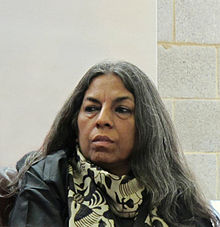
インドの規模の大きい悲劇は戦争のような悲惨さ、残酷さを引き起こし、それが現在に続くインド・パキスタンの敵対が続く70年だということが分る。分離独立を誰が目論んだか?宗主国だった英国とその同盟国家だろうか?拉致が多かった事実に驚く。ヒンズー教、シーク教、イスラム教、宗教対立の根の深さに唖然とする。キリスト教徒もカトリックとプロテスタントで激しい戦いを繰り返してきた歴史を持っている。宗教は安寧をもたらすのではなく、槍を投げるのである。なぜ?宗教が平和の絆にはならないということだろうか?内乱や動乱、混乱の中で、人々は悪に引きこまれていくようだ。抑制されていた欲望が、規範を良識を超えて蠢く。それが大勢の集団となると、犠牲も多くなる。国家の分裂の狭間で起こったことは、爆弾や砲弾が飛び交った沖縄の戦場とは異なる修羅である。隣人同士が、大きな手で分断され、移動を余儀なくされたとき、現実に起こったことは、凄まじい。拉致がもたらしたものは、レイプであり、子供達が産まれた。異教徒同士の男女の間に産まれたこともたちの宿命は、犬よりもひどい場合もあり、孤児院に引き取られた事例が多いようだ。子供達の事例に関心がいった。拉致され、レイプされ産まれた子供たちの宿命は母親の宗教やおかれた国の政策、社会環境、家族によっても分かれる。詳細は是非書籍を手にしてください。【今係わっている戦後の沖縄のテーマと関連して、興味をもっています】
悲惨な屈辱を怖れて次々自殺していった何万という女たちがいる。殺された多くの婦女子がいる。沖縄で起こった集団自決の規模をはるかに凌ぐ人々が身内の男達に殺され、あるいは自ら井戸に飛び込んだ。生き恥(陵辱)を生きるより死により個人の尊厳や名誉をまもるために。死は、生を聖なるものにする通路でもあったのである。生きる事は、潔癖さへの従順であり、それがそこなわれるより死を選んだのである。暴力の支配が平和だった村々を取り囲む時、戦い死ぬか、自殺の道しかなかったような凄まじさだ。異なる宗教を持った者たちが互いを敵対し、殺しあった。恐ろしい地獄図絵を生きて抜いてきた多くのパキスタン人とインド人、シーク教徒がいたのだ。時が癒してくれるのも事実かもしれない。過去の悲惨な経験を秘匿しながら、人々は生き延びてきた。それを掘り起こす必然性は、現在を問う必然性からでもあろうか?己は過去の積み重ねの上に存在する故に、過去をなかったことにすることはできない。
沖縄で今日、このウルワシー・ブターリアさんの講演があるようだ。すでに彼女のトークはこのブログで紹介した。YoutubeにUrvashi Butaliaを打ち込むと英語字幕付きの彼女のトークが拝聴できる。何よりこの日本語に翻訳された著名な著書が、彼女が成し遂げた功績を十分伝えるだろう。この本は琉球大図書館にはなかった。県立図書館にあっただろうか?定価の半額ほどでアマゾンで購入できるようだ。
ウルワシ・ブタリア氏と語る会には、今日当日でも申し込みOKのようです。県立博物館講座室、18:00-19:30 / asiapeace@spf.or.jp 高里鈴代さんもゲストですね!
Urvashi Butalia
| Urvashi Butalia | |
|---|---|

Urvashi Butalia in 2011
|
|
| Born | 1952 (age 64–65) Ambala, Haryana |
| Occupation | historian co-founder Kali for Women(1984), founder Zubaan Books(2003) |
| Website | www.zubaanbooks.com |
Urvashi Butalia (born 1952) is an Indian feminist and publisher. Along with Ritu Menon, she co-founded Kali for Women, India's first exclusively feminist publishing house, in 1984. In 2003, following the closure of Kali for Women, she founded Zubaan Books.[1]
Contents
[hide]
Early life and education
Butalia was born in Ambala, Haryana, into a very rich, progressive and atheist family of Punjabi heritage. She is the third of the four children of Joginder Singh Butalia and his wife Subhadra. Her mother, Subhadra Butalia, was a feminist who ran a counseling center for women. Butalia has one [elder] sister, Bela, and two brothers, Pankaj and Rahul.Pankaj Butalia is a left-wing documentary maker best known for a documentary on the miserable conditions of widows living in Vrindavan.
Butalia earned a BA in literature from Miranda House, Delhi University in 1971, a Masters in literature from Delhi University in 1973, and a Masters in South Asian Studies from the University of London in 1977.[2]
Career
Butalia started her career working with Oxford University Press in Delhi. She later worked for a year at their Oxford headquarters,[2] before moving briefly to London-based Zed Books as an editor in 1982. She then returned to India and, along with Ritu Menon, set up a feminist publishing house, Kali for Women, in 1984, .[3]
Butalia's main areas of interest are partition and oral histories from a feminist and left-wing perspective. She has written on gender, communalism, fundamentalism and media. Her writings have appeared in several newspapers and magazines publications including The Guardian, the New Internationalist, The Statesman, The Times of India, Outlook and India Today. She has been a regular columnist for the left-wing Tehelka and for Indian Printer and publisher, a B2B publication dealing with the print and publishing industry.
Butalia is a consultant for Oxfam India and she holds the position of Reader at the College of Vocational Studies at the University of Delhi.[2]
Kali for Women and Zubaan Books
Kali for Women, India's first exclusively feminist publishing house, which Butalia co-founded with and Ritu Menon, was set up in 1984 as a trust to increase the body of knowledge on women in the Third World, to give voice to such knowledge as already exists, and to provide a forum for women writers, creative and academics.[4]
In 2003, co-founders Urvashi Butalia and Ritu Menon parted ways due to unresolvable differences. Thereafter, Butalia started Zubaan Books, which besides feminist books also published fiction, general interest books, and children's titles, while Menon started Women Unlimited.[3]
In 2011, Butalia and Menon were jointly conferred the Padma Shri, India's fourth highest civilian award, by the Government of India.[5][6]
The Other Side of Silence
Apart from several newspaper articles and op-ed pieces dealing with feminist issues, Butalia has authored or co-authored seven books, listed below. Of these, The Other Side of Silence (1998) is being used as a text in some Indian universities. The book is the product of more than seventy interviews that Butalia conducted with survivors of the Partition, and emphasises particularly the role of violence against women in the collective experience of the tragedy.
Butalia points out that the Partition is, like the holocaust, still very much a "living history", in the sense that many survivors are still around and can be interviewed. In contrast to the many projects that have undertaken to document the oral histories of the Holocaust, few comparable initiatives have been undertaken in India. This is one of them.
Activism
Butalia is an associate of the Women's Institute for Freedom of the Press (WIFP).[7]
Bibliography
- Urvashi Butalia; Ritu Menon; Kali for Women (1992). In Other Words: New Writing by Indian Women. Kali for Women. ISBN 978-81-85107-48-6.
- Urvashi Butalia; Ritu Menon (1995). Making a Difference: Feminist Publishing in the South. Bellagio Pub. Network.
- Tanika Sarkar; Urvashi Butalia (1995). Women and the Hindu Right: A Collection of Essays. Kali For Women. ISBN 978-81-85107-66-0.
- Tanika Sarkar; Urvashi Butalia (1995). Women and Right Wing Movements: Indian Experiences. Zed Books, London. ISBN 978-1-85649-289-8.
- Urvashi Butalia (1998). The Other Side of Silence: Voices from the Partition of India. Penguin Books India. ISBN 978-0-14-027171-3.
- Urvashi Butalia (2002). Speaking Peace: Women's Voices from Kashmir. Kali for Women. ISBN 978-81-86706-43-5.
- Urvashi Butalia (ed.) (2006). Inner Line: The Zubaan Book of Stories by Indian Women. Zubaan. ISBN 978-81-89013-77-6.
References
- Jump up^ Daftuar, Swati (28 October 2010). "Identity matters". The Hindu. Retrieved 26 April 2013.
- ^ Jump up to:a b c "Bio – Butalia". Lettre Ulysses Award for the Art of Reportage. Retrieved 26 April 2013.
- ^ Jump up to:a b "Urvashi Butalia: I want to prove that feminist publishing can survive commercially". Livemint. 14 June 2013. Retrieved 16 August 2013.
- Jump up^ Jyoti Puri, Woman, Body, Desire in Postcolonial India: Narratives of Gender and Sexuality (London: Routledge, 1999)
- Jump up^ "Padma Awards Announced" (Press release). Ministry of Home Affairs. 25 January 2011. Retrieved 16 August 2013.
- Jump up^ "President Confers Padma Awards". Outlook India. 24 March 2011. Retrieved 26 April 2013.
- Jump up^ "Associates | The Women's Institute for Freedom of the Press". www.wifp.org. Retrieved 2017-06-21.
External links
| Wikimedia Commons has media related to Urvashi Butalia. |
原稿依頼があってこの冬はそのためのリサーチとテーマについてすこし纏める予定。そろそろ次のテーマに進まなければだが、なかなか前に進めないのはもどかしい。





















とてもいいことです!ユーラシア大陸が今注目されているのですね。アジアを包摂したユーラシアでしょうか?